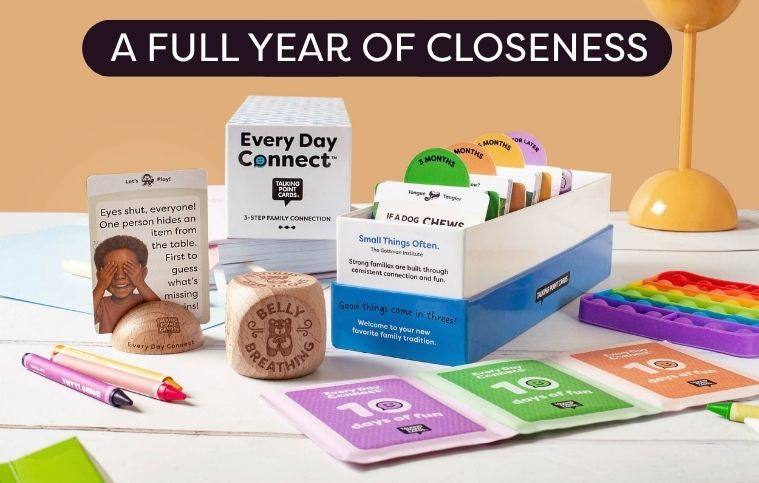Navigating Difficult Conversations with Your Teens
Let's face it - talking to teenagers can feel like trying to defuse a bomb while blindfolded. One wrong move and BOOM! You're suddenly the worst parent ever and they're stomping off to their room, slamming the door for good measure.
But here's the thing: those tricky conversations? They're actually really, really important. Like, "shaping your kid's entire future" levels of important. No pressure or anything.
So how do you get talking without it turning into World War III? How do you build those crucial communication skills and strengthen your relationship when your teen would rather eat glass than open up to you?
Buckle up, parents. We're diving into the terrifying (but rewarding!) world of difficult conversations with teens.
Before we get into the nitty-gritty, let's talk about why this stuff matters so dang much:
-
Teens who have good communication with their parents are less likely to engage in risky behaviors. Translation: fewer 2 AM phone calls from the police station. Yes please.
-
Open lines of communication = better mental health for your teen. In a world where teen anxiety and depression are skyrocketing, this is huge.
-
It sets them up for healthier relationships later in life. Future you will thank present you for this one.
-
You might actually end up enjoying your teen's company. I know, I know - sounds fake, but it's possible!
The bottom line? Figuring out how to navigate these conversations isn't just about surviving the teen years (although that's definitely a perk).
It's about setting your kid up for long-term success and happiness.
Now that we've covered the "why", let's dive into the "how".
1. Check Your Ego at the Door
Here's an uncomfortable truth: a lot of the time, we're the ones making these conversations difficult. We get defensive, we lecture, we pull the "Because I said so!" card.
But here's the thing - your teen is becoming their own person. They're going to have opinions and ideas that clash with yours. And that's okay! In fact, it's a good thing. It means their brain is developing and they're learning to think critically.
So before you even start the conversation, take a deep breath and remind yourself: this isn't about you being right. It's about understanding your teen and helping them navigate the world.
2. Listen. No, Really Listen.
We all think we're good listeners. But when it comes to our teens, we often fall into the trap of waiting for our turn to speak instead of truly hearing what they're saying.
Try this: the next time your teen is talking, focus on understanding their perspective rather than formulating your response. Ask clarifying questions. Reflect back what you're hearing to make sure you've got it right.
It might sound something like this:
"So what I'm hearing is that you feel overwhelmed by your school workload and you're worried about disappointing us if your grades slip. Is that right?"
This does two things:
-
It shows your teen that you're really listening
-
It gives them a chance to clarify if you've misunderstood something
3. Embrace the Power of "I" Statements
When it's your turn to speak, frame things in terms of how you feel rather than accusing or blaming. For example:
Instead of: "You never tell me anything! Why are you so secretive?"
Try: "I feel worried and out of the loop when I don't know what's going on in your life. I'd love to find a way for us to communicate more."
This approach is less likely to put your teen on the defensive and more likely to lead to a productive conversation.
4. Timing is Everything
Trying to have a serious conversation with a hangry teen who just got home from school? Yeah, that's not gonna end well.
Pick your moments wisely. Sometimes, the best conversations happen when you're doing something else together - driving in the car, cooking dinner, or just hanging out.
And if things start to get heated? It's okay to take a break and come back to the conversation later when everyone's calmed down.
5. Validate Their Feelings (Even if You Don't Agree)
This one's tough, but it's crucial. Your teen's feelings are real and valid, even if they seem completely irrational to you.
You don't have to agree with their actions or decisions, but acknowledging their emotions can go a long way in building trust and openness.
Try something like: "I can see why you'd feel that way. That sounds really frustrating/scary/upsetting."
Okay, so we've covered the general principles. But what about those really sticky subjects? You know, the ones that make you break out in a cold sweat just thinking about them?
The Sex Talk(s)
Yep, plural. Because it shouldn't be one big, awkward conversation - it should be an ongoing dialogue.
Some tips:
-
Start early and keep it age-appropriate
-
Be honest and factual
-
Use correct anatomical terms (no "birds and bees" euphemisms here)
-
Discuss consent and healthy relationships, not just the mechanics
-
Be prepared for questions (and it's okay to say "I don't know, let's look that up together")
Remember: if you don't talk to them about this stuff, they're going to get their information elsewhere. And trust me, you'd rather it come from you than from Timmy's older brother who "knows everything".
Substance Use
This is a tricky one because let's face it - teens are going to encounter drugs and alcohol, and simply saying "Just say no!" isn't going to cut it.
Instead, focus on:
-
Honest education about the effects and risks
-
Discussing why people use substances
-
Developing strategies for handling peer pressure
-
Creating a safety plan (like a no-questions-asked ride home if they're ever in an unsafe situation)
The goal here isn't to scare them (that rarely works), but to equip them with the knowledge and skills to make informed decisions.
Teens Pack
223 Reviews
$38.95 $29.95 AUD
Save $9
Mental Health
With teen mental health issues on the rise, this is a crucial conversation. But it can also be one of the hardest, especially if your teen is struggling.
Some key points:
-
Normalize talking about feelings and mental health
-
Discuss the signs of depression, anxiety, and other common issues
-
Create a supportive, non-judgmental environment
-
Know when to seek professional help
Remember: you don't have to have all the answers. Sometimes, just being there and listening is enough.
The Future (Cue Existential Crisis)
College? Career? The meaning of life? These big questions can be overwhelming for teens (and let's be honest, for adults too).
When tackling these topics:
-
Focus on exploring options rather than making definitive decisions
-
Encourage them to pursue their interests and strengths
-
Discuss different paths to success (college isn't the only option!)
-
Share your own experiences, including mistakes and lessons learned
The key here is to be a supportive guide, not a drill sergeant barking orders about their future.
by Ben Jones
Aug 26 2024 • 10 min read
Family • Get Talking • Teens
More Like This...
Dec 15 2022 • 8 min read
Family • Get Talking • Children
Dec 7 2022 • 8 min read
Family • Get Talking • Children
Family Favourites
(4230)
(691)
(102)
(7)






